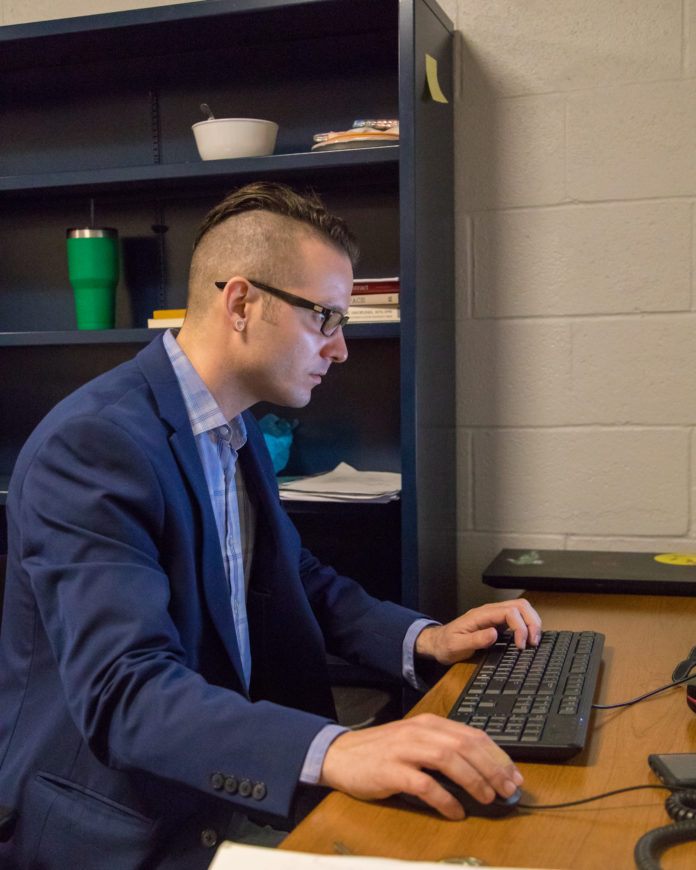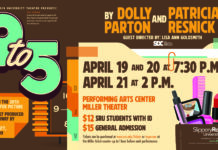Nicholas Katsiadas, a professor of english at Slippery Rock University, was recently selected to the board of the Pennsylvania College English Association, an organization that provides a platform for civil discourse and people to discuss literature, their research, and creative and professional writing.
Made up of all of the state universities, Pennsylvania College English allows for civil discourse, which is something Katsiadas believes is vital on both sides of the political spectrum.
“It’s the whole nine yards with English studies,” Katsiadas said. “It’s more of a generalist approach to see who is involved within the research community and also within the teaching community as well.”
When he started instructing here, Katsiadas was looking to fulfill service opportunities and was welcomed with open arms by fellow professor Itzi Meztli, who invited him to begin planning the Pennsylvania English Association Conference. The symposium, titled “Engendering Narrative: Transforming Image, Text, and Medium,” will be held at Slippery Rock University April 22-24 in the Smith Student Center.
Katsiadas will sit in on board meetings to discuss future conference opportunities and will also collaborate to choose the theme of the gatherings. Along with Meztli, Katsiadas has been guided by Jessica Jopp and Michaela O’Toole, both professors in Slippery Rock’s English department. The board is soon to launch discussion on 2021’s conference.
Katsiadas has tabbed Danette DiMarco, the chair of SRU’s English department, and artist Marcel Walker, as guest speakers and has been combing through submitted abstracts of those who would like to attend.
“[The planning] is not as much of a challenge in terms of intellectual rigor as it is a challenge to make sure I dot all of my I’s and cross all of my T’s.”
Katsiadas is heavily involved with Sigma Tau Delta, the english honors society, and is trying to provide opportunities for undergraduates to explore these conferences.
“If [undergrads] are interested in grad school, it’s a good place for people to network,” Katsiadas said. “Editors sit in on conference presentations, so not only do people have the opportunity for networking and presenting, but also to publish, too.”
Katsiadas said that, right now, people aren’t aware if they professionally develop. For Katsiadas, entering this community is a chance to engage in civil conversations, no matter how difficult they may be.
“This is the culmination of 15 years of being in school,” said Katsiadas, who graduated from SRU with his bachelor’s and master’s degrees. “Being able to call these people my colleagues, and to be able to trust what they say and rely upon them for the promotion of literary studies is super important to me […] I feel privileged to be a part of it.”
Described as “the world’s largest professional organization for researching and teaching composition, from writing to new media” in its website, the Conference on College Composition and Communication will host Katsiadas for its yearly convention in March.
In a combination of his dissertation and doctoral work, Katsiadas, who bought his first comic when he was five, tries to promote writing as collaborative and looks at the way the “Marvel Method” can act as an analogy.
“In the Marvel Method, you have a bunch of people collaborating on one title or one issue,” Katsiadas said. “You have a writer, a penciler, an inker, a colorist, and an editor. We want to demystify the myth of the ‘lonely artist’ sitting in their room by themselves, just writing. That’s not how writing works at all.”
The presentation is actually a performance, Katsiadas said, in which he and his colleagues dress as the Avengers and have a dialogue. In their first recital, Thanos served as the heel, trying to discourage the heroes from attempting to reinvigorate composition as a practice within the university.
He will also present the study of comic book pedagogy and the Romantic literary history of comics at the gathering. Katsiadas will also offer the presentation at the 2019 Mid-Atlantic Popular and American Culture Association regional conference in Pittsburgh in November and at the 2020 Popular Culture Association national conference in Philadelphia in mid-April.
“In comic studies, people gravitate to superheroes and a lot of studies involve comparatively reading superheroes with classical mythology,” Katsiadas said, likening Superman to Hercules as an example. “But, there’s an entire spectrum of mythology that you’re not paying attention to that we can generate opportunities to better understand the literary history of comics as not solely within classical mythology and religion.”








